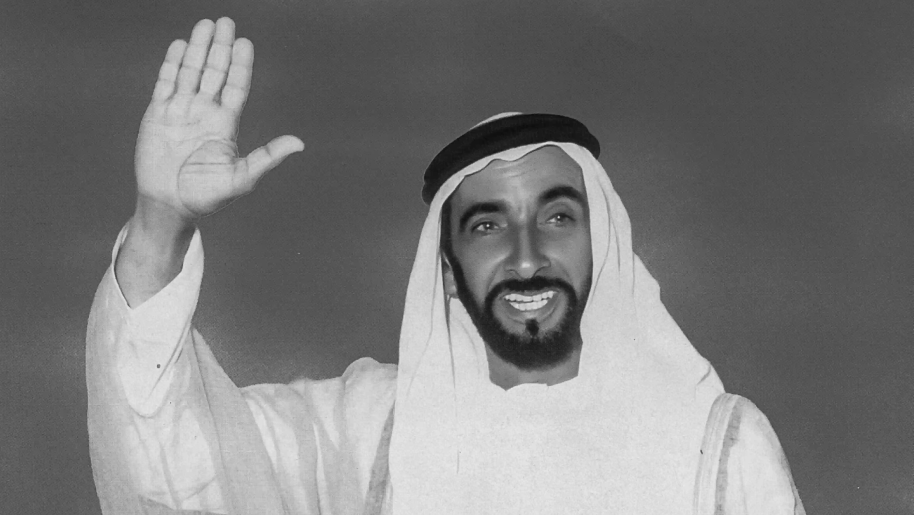The late Sheikh Zayed bin
Sultan Al Nahyan

The late Sheikh Zayed bin Sultan Al Nahyan, the Founding Father of the United Arab Emirates (UAE), was born in 1918 at Qasr Al Hosn in Abu Dhabi. He was the youngest child of Sheikh Sultan bin Zayed bin Khalifa Al Nahyan, who ruled Abu Dhabi from 1922 to 1926. Having grown up in Qasr Al Hosn until the age of eight, Sheikh Zayed then moved to the Al Ain region. There, he was immersed in an authentic Bedouin environment, which profoundly shaped his personality, endowing him with ethics, wisdom, and composure. He received his education under the guidance of religious scholars, especially Abdullah bin Ghanem, who instructed him in Quranic studies, literacy, and basic arithmetic. Additionally, the 'majlis,' a cultural and social institution, significantly contributed to his personal development, instilling in him many values, customs, and traditions.
Between 1946 and 1966, he served as the Ruler’s Representative of Abu Dhabi in the Al Ain Region, dedicating himself to enhancing the living standards of its residents. His initiatives included the construction of Aflaj irrigation systems, support for oil exploration, and a commitment to the environment. In 1956, he founded the first school in Al Muwaiji, followed by Al Nahyaneia School in 1959, marking the establishment of the first formal school in the Al Ain Region within the Emirate of Abu Dhabi.
Assuming leadership of the Emirate of Abu Dhabi from 1966 to 2004, Sheikh Zayed oversaw significant developments. He initiated Abu Dhabi's entry into the Organization of the Petroleum Exporting Countries (OPEC) in 1967 and the Organisation of Arab Petroleum Exporting Countries (OAPEC) in 1970. The following year, he authorised the creation of the Abu Dhabi National Oil Company, the country's first national oil company. Throughout his rule, Sheikh Zayed prioritised comprehensive development and established the Abu Dhabi Investment Authority to manage the Emirate's financial investments.
In 1971, the federation was established, a culmination of Sheikh Zayed's firm belief in the importance of this union for nation-building. As a result, he was elected President of the United Arab Emirates. This idea of the union was not an impromptu decision; as the Founding Father had recognised that unity was essential for building a single nation for all. Back in 1968, Sheikh Zayed, then the ruler of Abu Dhabi, along with Sheikh Rashid bin Saeed Al Maktoum, Ruler of Dubai, signed the initial union agreement between Abu Dhabi and Dubai in the Al Sameeh area, on their shared border. On December 1, 1971, following the annulment of treaties between the seven emirates and the British Government, the United Arab Emirates was established the next day, and Sheikh Zayed was elected as its President.
That same year, the UAE bolstered its global presence by joining both the Arab League and the United Nations. Sheikh Zayed, who firmly believed in unity and cooperation, played a key role in the establishment of the Gulf Cooperation Council (GCC). The charter of the GCC was signed by the six Gulf states during its inaugural summit in Abu Dhabi in 1981. Furthermore, he championed the cause of Emirati women by appointing the first female minister in the history of the Emirates.
His leadership was characterised by significant efforts in developing the state and reinforcing its position on the global stage. In acknowledgment of his exceptional role in the UAE and internationally, he was bestowed with numerous awards and honours. These accolades include the Man of Environment and Development in 1993 and the Golden Panda Award in 1997.
On November 2, 2004 (19 Ramadan 1425 AH), the passing of Sheikh Zayed at the age of 86 was announced. His legacy continues to live on despite his absence; it is deeply engraved in the hearts of his people, ingrained in the governance of the UAE, and recognised globally as a testament to the extraordinary legacy of a great leader.

